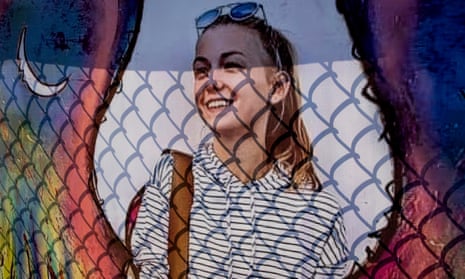“It’s time for us to speak out”: Eya and Taysir (foreground) with the actresses playing their sisters in the film “Four Daughters”, director Kaouther Ben Hania Photo: Kino Lorber
“This is a tragedy. I hate girls. I didn’t want to have daughters,” says Olfa Hamrouni in “Four Daughters,” an Oscar-nominated documentary that attempts to explain why her two eldest children left their home in Tunisia to join the Islamic State. Like Shamima Begum, who last week lost her appeal to have her British citizenship restored, Ghofran and Rahma Chikaoui were teenagers, aged 16 and 15, when they became jihadist brides.
“When this story first appeared in the news, there was so much condemnation,” Kaouther Ben Hania, the film’s director, tells me via video link from Paris. “People condemned the girls, condemned Olfa, calling her a terrible mother. I wanted to understand why these two young girls were drawn to this painful path.”
Four Daughters is a slippery film that continually misleads viewers as it blurs the line between documentary interviews and dramatic reenactments. In the latter, the absent older sisters are played by actresses, while the two younger ones, Eya and Taysir, who were 11 and 8 when their siblings left, appear as themselves. “I usually hate reenactments in documentaries,” says Ben Hania. “They're so cliché. But then I remembered what Hitchcock said: it’s better to start with a cliché than to end with one.”
Ben Hania puts the mother at the center of the story. “From the first time I saw her, I was fascinated by [her] contradictions,” she says. “On the one hand, she is a strong, independent, charismatic woman. On the other hand, she fiercely imposed these very strong patriarchal ideas on her daughters. I asked why she did it.”
One answer lies in Olfa's childhood: she was raised by a single mother along with her sisters in a culture where girls were constantly vulnerable to attacks from local men. Little Olfa became the protector of her family: she dressed as a boy, cut off her hair and used her fists to defend her home from intruders. She was eventually married off; On their wedding night, her sister urged the groom to take Olfa's virginity, by force if necessary, and then demanded that, as was tradition, he wave the bloody sheet outside the marital bedroom. Olfa agreed, breaking her new groom's nose and staining his linen with blood.

When “Four Daughters” repeats this moment, the actress playing Olfa breaks character, turns to her real-life colleague and asks in horror if it is true that the sister she once protected incited her husband to rape her. “Yes,” Olfa nods, her direct confession carries an emotional power that surpasses any reconstruction.
Olfa goes on to explain that her husband never kissed her and only slept with her in order to impregnate her: more daughters were born in subsequent years. The girls' father began coming into their bedroom at night, questioning their virtue and calling them whores. Their mother enforced the girls' virtue with the same cruelty. Then, in 2011, Hamrouni left her husband, taking her daughters with her.
Then things took an even darker turn. Olfa fell in love with Wassim, a convicted murderer who moved into their house and began raping her daughters. As they say on camera: “He loved her at night, and us during the day.” The film shows how Olfa even now calls this man her “angel.” “Wassim is a difficult subject for Olfa,” sighs Ben Hania. “For the first time, she allowed herself to experience feelings, to fall in love. There is so much guilt and shame in her.”
 “It’s better to start with a cliché than to end with one”: director Kaouther Ben Hania Photo: Tim P. Whitby
“It’s better to start with a cliché than to end with one”: director Kaouther Ben Hania Photo: Tim P. Whitby
In the most arresting scene in Four Daughters, the actor playing Wassim lies on a bed while two real sisters sit at his feet, playing with a knife and detailing his crimes. The actor cannot stand it and asks to leave. “None of this was in the script,” says Ben Hania. “He didn't know what was going to happen.” During filming, she was “shaking, asking herself what I thought I was doing, putting these people in this situation. But the little girl Eya calmed us down – it was she who said: “I want this scene, I want this story to be told.”
It is not surprising that the eldest daughters grew up to be difficult teenagers. Gofran became a goth: she dyed her hair blue, listened to rock music and dreamed of being buried alive. “I think these extremes of sex and death, Eros and Thanatos, are what attract most teenagers,” says Ben Hania. “Their personalities change and even their bodies change. They strive for strong ideas without understanding the consequences.”
A British girl dressed as a goth wouldn't raise an eyebrow. But in Tunisia, Gofran was challenged by men on the street. At home, noticing that she had shaved her legs, her mother beat her until she lost consciousness. Angered by the crowd, who told Gofran that she would be punished for her behavior in the afterlife, the girl destroyed her notes and converted to extreme Islam.
Throughout the film, Ben Hania's camera exploits the beauty of female movie stars—the director tells me she was inspired to light them the way Ingmar Bergman lit his heroines—but she's also keenly aware that such beauty is a double-edged sword in a conventional world. Arab cultures. “As a teenager, to be beautiful you have to be defensive,” she says. “Covering this beauty can become a kind of armor.”
 “Covering beauty can be a kind of armor”: Eya Chihaoui and Nour Karui in the film “Four Daughters” Photo: AP/Kino Lorber
“Covering beauty can be a kind of armor”: Eya Chihaoui and Nour Karui in the film “Four Daughters” Photo: AP/Kino Lorber
In Tunisia, the hijab was banned during the dictatorship of Zine el-Abidine Ben Ali, and after the revolution that led to his ouster, it acquired a rebellious charm. Young people have adopted the hijab as an anti-establishment gesture; for Ghofran, it allowed her to upend the power dynamics in her home—she suddenly became more pious than their strict mother. She gave her impulse to self-harm a holy zeal, self-flagellation for her sins; she beat her sisters for missing prayers and dreamed of stoning other women to death. It was the first step on the path to radicalization: within just a few months, in 2015, both eldest daughters fled and joined the Islamic State in Libya.
Ben Hania hopes her film will help Western audiences understand that while Four Daughters is “an intimate, personal story set in a specific geopolitical context,” there are universal impulses at work here: it may not be a million miles from for a British teenager to be pulled along. into the world of Andrew Tate or an American child lured into QAnon conspiracies.
Both eldest daughters, who survived the bombing of the Islamic State compound in which they lived, are now in a Libyan prison awaiting trial. “They pay a very high price for completely unconscious, crazy choices,” says Ben Hania. “They are very sorry about this.” At the time of her imprisonment, Gofran had just given birth to her daughter Fatma, who is now eight years old and has no experience of life outside prison walls.
Via WhatsApp, Eya and Taysir, who have started a new life in Egypt, told me that they talk to their sisters on the phone once a month. They are glad the film has helped open communication with their mother and hope its release will put pressure on Libya to return their sisters and niece to Tunisia. “Even if this does not mean they are released, at least allow them to face the justice system in their country,” they say. “We need to show our niece the world, send her to school and show her that there is life outside of prison.”
Eya plays sports, and Taysir is studying to be a nurse. They told me that their mother had remarried. They said making the film taught them “that it's time for us to speak up… that we need to be more honest and open with each other.”
First of all, they tell me: “We have learned that we are stronger than anything in the world. No one can scare us or stop us from living our lives.”
Four Daughters is currently showing in theaters.





























































Recent Comments